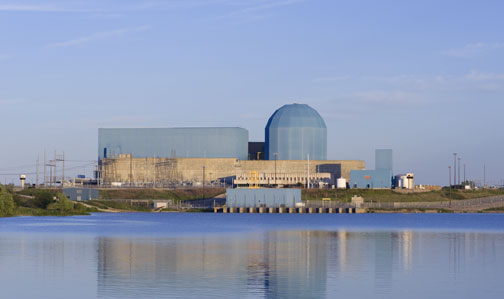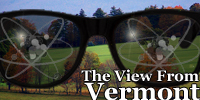Advocating for Nuclear with the NESD
Sometimes it feels like we're fighting an uphill battle for nuclear energy - and perhaps we are.

A message from Goodway Technologies
Optimizing Maintenance Strategies in Power Generation: Embracing Predictive and Preventive Approaches
Sometimes it feels like we're fighting an uphill battle for nuclear energy - and perhaps we are.

Clinton Power Station, courtesy Exelon Nuclear
Yesterday, June 2, 2016, may have marked a watershed moment in the present day history of nuclear power plants in the United States, when two nuclear plants were selected by their owner for shutdown far in advance of their license expiration dates for economic reasons. The fast-moving pace of plants being shut down under similar economic circumstances (unbalanced energy markets that favor other forms of energy to the detriment of nuclear) signals a broken system that must be changed, now.
I told some friends the other day that I often feel like a time traveler from the Age of Reason who sees questionable behavior and is forced by training to ask, "Why?"
During an earnings call on February 6, 2014, Exelon Corporation indicated that it may decide to shut down two or more of its nuclear reactors because of poor economic return. Exelon spokespeople have been warning about the effects of negative electricity prices for several years.
Since the natural gas price collapse that started in summer 2008, many observers have become accustomed to using the adjective "cheap" when talking about natural gas. Like the word "clean," another adjective often applied to methane, "cheap" is a relative term. It is also a term whose applicability depends on time and location. As I wrote in a recent post on Atomic Insights, gas is only really cheap if nobody needs it. When demand increases due to some kind of perfectly natural phenomenon-like a winter with near normal temperatures-demand can exceed deliverability by a large margin.
During the past several years, I have been following the progress of a strange situation in my adopted state of Virginia. Despite being a state with a long history of mining and mineral extraction, we have a law in place that forbids mining one specific element-uranium. The law is technically just a temporary moratorium put in place in order to give the state's regulators time to draft effective regulations, but the law enacting the moratorium was put into place more than 30 years ago.
The world oil market is not a free market. Prices are manipulated by a small number of producers that adjust production rates to achieve desired prices that are high enough to provide maximum profits, without being high enough to encourage customers to aggressively pursue alternative energy sources.
There is a good reason for American nuclear energy professionals to learn more about the dynamics of the natural gas market. We have been told numerous times that cheap natural gas is making our technology less and less viable in the competitive market place. Natural gas (also known as methane) is a terrific product, but it has been promoted as being capable of supplying a much larger portion of our overall energy demand. That promotional effort is putting us all at risk of a severe hangover when the low price bubble bursts.
 On Sunday, March 31, 2013, just a few months before his 91st birthday, Ted Rockwell passed away quietly in his sleep. His passing has stimulated a profound sense of loss among nuclear energy professionals.
On Sunday, March 31, 2013, just a few months before his 91st birthday, Ted Rockwell passed away quietly in his sleep. His passing has stimulated a profound sense of loss among nuclear energy professionals.
 There are many benefits to living in Lynchburg, Virginia. Not only is it a scenically beautiful place with a diverse and growing economy that has continued its steady progress, even during the Great Recession, but it is also a place full of people who appreciate the value of nuclear energy technology.
There are many benefits to living in Lynchburg, Virginia. Not only is it a scenically beautiful place with a diverse and growing economy that has continued its steady progress, even during the Great Recession, but it is also a place full of people who appreciate the value of nuclear energy technology.
This past weekend the world quietly marked the 70th anniversary of the initial criticality of CP-1 (Critical Pile 1), the 55th anniversary of the initial criticality of the Shippingport nuclear power plant, and the decommissioning of the USS Enterprise, a 51 year-old nuclear-powered aircraft carrier. Those events have put me into a reflective but incredibly optimistic mood.
 On November 7, an important hearing about the Vermont Yankee nuclear power plant was held before the Vermont Public Service Board. Howard Shaffer has an excellent post on this hearing at ANS Nuclear Cafe.
On November 7, an important hearing about the Vermont Yankee nuclear power plant was held before the Vermont Public Service Board. Howard Shaffer has an excellent post on this hearing at ANS Nuclear Cafe.
The 2012 Nuclear Energy Assembly wrapped up this Wednesday evening in Charlotte, NC. The Nuclear Energy Assembly is the nuclear energy industry's annual conference, attracting leaders worldwide from all segments of the industry.
 The 4th annual Texas Atomic Film Festival (TAFF) is being held April 26 to May 3, 2012. The festival attracts short films (3 to 5 minutes) produced by students in nuclear engineering courses at the University of Texas at Austin. A public screening of the films, which focus on nuclear and energy related topics, is being held on April 26 at 12:30 pm at the UT Student Activities Center auditorium.
The 4th annual Texas Atomic Film Festival (TAFF) is being held April 26 to May 3, 2012. The festival attracts short films (3 to 5 minutes) produced by students in nuclear engineering courses at the University of Texas at Austin. A public screening of the films, which focus on nuclear and energy related topics, is being held on April 26 at 12:30 pm at the UT Student Activities Center auditorium.
Tamil Nadu provincial government support pulls rug out from under protest groups
The plant dodges another bullet at least for now
(This article summarizes a paper presented by the author at the ASME 2011 Small Modular Reactors Symposium)
 Back in the playground-about half a century ago-I learned that it can be fun and frustrating to the bullies if you cheerfully accept the tags that they apply to you. Back then, I was called a four-eyed nerd; for some odd reason I had schoolmates who thought it was a bad thing to be the one who got straight A's and seemed to enjoy learning. The teasing did not bother me; it motivated me to read more good books and to strive to do even better in class.
Back in the playground-about half a century ago-I learned that it can be fun and frustrating to the bullies if you cheerfully accept the tags that they apply to you. Back then, I was called a four-eyed nerd; for some odd reason I had schoolmates who thought it was a bad thing to be the one who got straight A's and seemed to enjoy learning. The teasing did not bother me; it motivated me to read more good books and to strive to do even better in class.
On Thursday, December 1, 2011, the University of Chicago's Energy Policy Institute at Chicago (EPIC) released a study titled Small Modular Reactors - Key to Future Nuclear Power Generation in the U. S..
American Nuclear Society President Eric Loewen discusses the benefits of nuclear energy in this news clip, filmed in conjunction with a speaking trip to Virginia Commonwealth University.